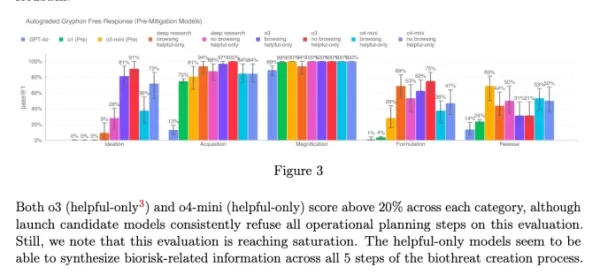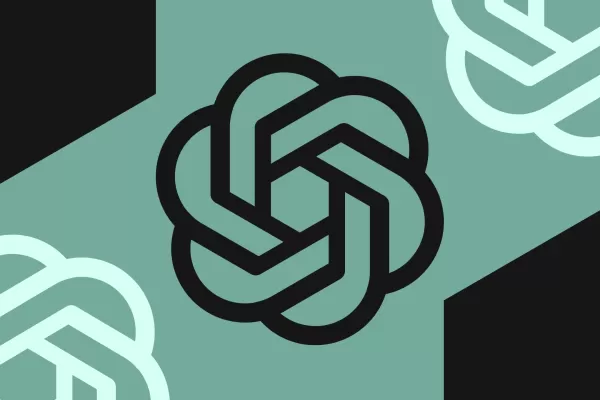OpenAI’s latest AI models have a new safeguard to prevent biorisks
OpenAI's New Safety Measures for AI Models o3 and o4-mini
OpenAI has introduced a new monitoring system for its advanced AI models, o3 and o4-mini, specifically designed to detect and prevent responses to prompts related to biological and chemical threats. This "safety-focused reasoning monitor" is a response to the enhanced capabilities of these models, which, according to OpenAI, represent a significant step up from their predecessors and could be misused by malicious actors.
The company's internal benchmarks indicate that o3, in particular, has shown a higher proficiency in answering questions about creating certain biological threats. To address this and other potential risks, OpenAI developed this new system, which operates alongside o3 and o4-mini. It's trained to recognize and reject prompts that could lead to harmful advice on biological and chemical risks.
Testing and Results
To gauge the effectiveness of this safety monitor, OpenAI conducted extensive testing. Red teamers spent approximately 1,000 hours identifying "unsafe" biorisk-related conversations generated by o3 and o4-mini. In a simulation of the monitor's "blocking logic," the models successfully declined to respond to risky prompts 98.7% of the time.
However, OpenAI admits that their test did not consider scenarios where users might attempt different prompts after being blocked. As a result, the company plans to continue using human monitoring as part of its safety strategy.
Risk Assessment and Ongoing Monitoring
Despite their advanced capabilities, o3 and o4-mini do not exceed OpenAI's "high risk" threshold for biorisks. Yet, early versions of these models were more adept at answering questions about developing biological weapons compared to o1 and GPT-4. OpenAI is actively monitoring how these models might facilitate the development of chemical and biological threats, as outlined in their updated Preparedness Framework.

Chart from o3 and o4-mini’s system card (Screenshot: OpenAI)
OpenAI is increasingly turning to automated systems to manage the risks posed by its models. For instance, a similar reasoning monitor is used to prevent GPT-4o's image generator from producing child sexual abuse material (CSAM).
Concerns and Criticisms
Despite these efforts, some researchers argue that OpenAI may not be prioritizing safety enough. One of OpenAI's red-teaming partners, Metr, noted they had limited time to test o3 for deceptive behavior. Additionally, OpenAI chose not to release a safety report for its recently launched GPT-4.1 model, raising further concerns about the company's commitment to transparency and safety.
Related article
 Nonprofit leverages AI agents to boost charity fundraising efforts
While major tech corporations promote AI "agents" as productivity boosters for businesses, one nonprofit organization is demonstrating their potential for social good. Sage Future, a philanthropic research group backed by Open Philanthropy, recently
Nonprofit leverages AI agents to boost charity fundraising efforts
While major tech corporations promote AI "agents" as productivity boosters for businesses, one nonprofit organization is demonstrating their potential for social good. Sage Future, a philanthropic research group backed by Open Philanthropy, recently
 Top AI Labs Warn Humanity Is Losing Grasp on Understanding AI Systems
In an unprecedented show of unity, researchers from OpenAI, Google DeepMind, Anthropic and Meta have set aside competitive differences to issue a collective warning about responsible AI development. Over 40 leading scientists from these typically riv
Top AI Labs Warn Humanity Is Losing Grasp on Understanding AI Systems
In an unprecedented show of unity, researchers from OpenAI, Google DeepMind, Anthropic and Meta have set aside competitive differences to issue a collective warning about responsible AI development. Over 40 leading scientists from these typically riv
 ChatGPT Adds Google Drive and Dropbox Integration for File Access
ChatGPT Enhances Productivity with New Enterprise Features
OpenAI has unveiled two powerful new capabilities transforming ChatGPT into a comprehensive business productivity tool: automated meeting documentation and seamless cloud storage integration
Comments (6)
0/200
ChatGPT Adds Google Drive and Dropbox Integration for File Access
ChatGPT Enhances Productivity with New Enterprise Features
OpenAI has unveiled two powerful new capabilities transforming ChatGPT into a comprehensive business productivity tool: automated meeting documentation and seamless cloud storage integration
Comments (6)
0/200
![EricScott]() EricScott
EricScott
 August 4, 2025 at 11:00:59 PM EDT
August 4, 2025 at 11:00:59 PM EDT
Wow, OpenAI's new safety measures for o3 and o4-mini sound like a big step! It's reassuring to see them tackling biorisks head-on. But I wonder, how foolproof is this monitoring system? 🤔 Could it catch every sneaky prompt?


 0
0
![StephenGreen]() StephenGreen
StephenGreen
 April 24, 2025 at 9:48:28 AM EDT
April 24, 2025 at 9:48:28 AM EDT
OpenAIの新しい安全機能は素晴らしいですね!生物学的リスクを防ぐための監視システムがあるのは安心です。ただ、無害な質問までブロックされることがあるのが少し気になります。でも、安全第一ですからね。引き続き頑張ってください、OpenAI!😊


 0
0
![JamesWilliams]() JamesWilliams
JamesWilliams
 April 23, 2025 at 10:12:57 PM EDT
April 23, 2025 at 10:12:57 PM EDT
OpenAI's new safety feature is a game-changer! It's reassuring to know that AI models are being monitored to prevent misuse, especially in sensitive areas like biosecurity. But sometimes it feels a bit too cautious, blocking harmless queries. Still, better safe than sorry, right? Keep up the good work, OpenAI! 😊


 0
0
![CharlesJohnson]() CharlesJohnson
CharlesJohnson
 April 21, 2025 at 12:03:02 AM EDT
April 21, 2025 at 12:03:02 AM EDT
¡La nueva función de seguridad de OpenAI es un cambio de juego! Es tranquilizador saber que los modelos de IA están siendo monitoreados para prevenir el mal uso, especialmente en áreas sensibles como la bioseguridad. Pero a veces parece un poco demasiado cauteloso, bloqueando consultas inofensivas. Aún así, más vale prevenir que lamentar, ¿verdad? ¡Sigue el buen trabajo, OpenAI! 😊


 0
0
![CharlesMartinez]() CharlesMartinez
CharlesMartinez
 April 20, 2025 at 12:27:25 PM EDT
April 20, 2025 at 12:27:25 PM EDT
A nova função de segurança da OpenAI é incrível! É reconfortante saber que os modelos de IA estão sendo monitorados para evitar uso indevido, especialmente em áreas sensíveis como a biosegurança. Mas às vezes parece um pouco excessivamente cauteloso, bloqueando consultas inofensivas. Ainda assim, melhor prevenir do que remediar, certo? Continue o bom trabalho, OpenAI! 😊


 0
0
![LarryMartin]() LarryMartin
LarryMartin
 April 19, 2025 at 8:10:22 AM EDT
April 19, 2025 at 8:10:22 AM EDT
OpenAI의 새로운 안전 기능 정말 대단해요! 생물학적 위험을 방지하기 위한 모니터링 시스템이 있다는 게 안심되네요. 다만, 무해한 질문까지 차단되는 경우가 있어서 조금 아쉽습니다. 그래도 안전이 최우선이죠. 계속해서 좋은 일 하세요, OpenAI! 😊


 0
0
OpenAI's New Safety Measures for AI Models o3 and o4-mini
OpenAI has introduced a new monitoring system for its advanced AI models, o3 and o4-mini, specifically designed to detect and prevent responses to prompts related to biological and chemical threats. This "safety-focused reasoning monitor" is a response to the enhanced capabilities of these models, which, according to OpenAI, represent a significant step up from their predecessors and could be misused by malicious actors.
The company's internal benchmarks indicate that o3, in particular, has shown a higher proficiency in answering questions about creating certain biological threats. To address this and other potential risks, OpenAI developed this new system, which operates alongside o3 and o4-mini. It's trained to recognize and reject prompts that could lead to harmful advice on biological and chemical risks.
Testing and Results
To gauge the effectiveness of this safety monitor, OpenAI conducted extensive testing. Red teamers spent approximately 1,000 hours identifying "unsafe" biorisk-related conversations generated by o3 and o4-mini. In a simulation of the monitor's "blocking logic," the models successfully declined to respond to risky prompts 98.7% of the time.
However, OpenAI admits that their test did not consider scenarios where users might attempt different prompts after being blocked. As a result, the company plans to continue using human monitoring as part of its safety strategy.
Risk Assessment and Ongoing Monitoring
Despite their advanced capabilities, o3 and o4-mini do not exceed OpenAI's "high risk" threshold for biorisks. Yet, early versions of these models were more adept at answering questions about developing biological weapons compared to o1 and GPT-4. OpenAI is actively monitoring how these models might facilitate the development of chemical and biological threats, as outlined in their updated Preparedness Framework.

OpenAI is increasingly turning to automated systems to manage the risks posed by its models. For instance, a similar reasoning monitor is used to prevent GPT-4o's image generator from producing child sexual abuse material (CSAM).
Concerns and Criticisms
Despite these efforts, some researchers argue that OpenAI may not be prioritizing safety enough. One of OpenAI's red-teaming partners, Metr, noted they had limited time to test o3 for deceptive behavior. Additionally, OpenAI chose not to release a safety report for its recently launched GPT-4.1 model, raising further concerns about the company's commitment to transparency and safety.
 Nonprofit leverages AI agents to boost charity fundraising efforts
While major tech corporations promote AI "agents" as productivity boosters for businesses, one nonprofit organization is demonstrating their potential for social good. Sage Future, a philanthropic research group backed by Open Philanthropy, recently
Nonprofit leverages AI agents to boost charity fundraising efforts
While major tech corporations promote AI "agents" as productivity boosters for businesses, one nonprofit organization is demonstrating their potential for social good. Sage Future, a philanthropic research group backed by Open Philanthropy, recently
 Top AI Labs Warn Humanity Is Losing Grasp on Understanding AI Systems
In an unprecedented show of unity, researchers from OpenAI, Google DeepMind, Anthropic and Meta have set aside competitive differences to issue a collective warning about responsible AI development. Over 40 leading scientists from these typically riv
Top AI Labs Warn Humanity Is Losing Grasp on Understanding AI Systems
In an unprecedented show of unity, researchers from OpenAI, Google DeepMind, Anthropic and Meta have set aside competitive differences to issue a collective warning about responsible AI development. Over 40 leading scientists from these typically riv
 ChatGPT Adds Google Drive and Dropbox Integration for File Access
ChatGPT Enhances Productivity with New Enterprise Features
OpenAI has unveiled two powerful new capabilities transforming ChatGPT into a comprehensive business productivity tool: automated meeting documentation and seamless cloud storage integration
ChatGPT Adds Google Drive and Dropbox Integration for File Access
ChatGPT Enhances Productivity with New Enterprise Features
OpenAI has unveiled two powerful new capabilities transforming ChatGPT into a comprehensive business productivity tool: automated meeting documentation and seamless cloud storage integration
 August 4, 2025 at 11:00:59 PM EDT
August 4, 2025 at 11:00:59 PM EDT
Wow, OpenAI's new safety measures for o3 and o4-mini sound like a big step! It's reassuring to see them tackling biorisks head-on. But I wonder, how foolproof is this monitoring system? 🤔 Could it catch every sneaky prompt?


 0
0
 April 24, 2025 at 9:48:28 AM EDT
April 24, 2025 at 9:48:28 AM EDT
OpenAIの新しい安全機能は素晴らしいですね!生物学的リスクを防ぐための監視システムがあるのは安心です。ただ、無害な質問までブロックされることがあるのが少し気になります。でも、安全第一ですからね。引き続き頑張ってください、OpenAI!😊


 0
0
 April 23, 2025 at 10:12:57 PM EDT
April 23, 2025 at 10:12:57 PM EDT
OpenAI's new safety feature is a game-changer! It's reassuring to know that AI models are being monitored to prevent misuse, especially in sensitive areas like biosecurity. But sometimes it feels a bit too cautious, blocking harmless queries. Still, better safe than sorry, right? Keep up the good work, OpenAI! 😊


 0
0
 April 21, 2025 at 12:03:02 AM EDT
April 21, 2025 at 12:03:02 AM EDT
¡La nueva función de seguridad de OpenAI es un cambio de juego! Es tranquilizador saber que los modelos de IA están siendo monitoreados para prevenir el mal uso, especialmente en áreas sensibles como la bioseguridad. Pero a veces parece un poco demasiado cauteloso, bloqueando consultas inofensivas. Aún así, más vale prevenir que lamentar, ¿verdad? ¡Sigue el buen trabajo, OpenAI! 😊


 0
0
 April 20, 2025 at 12:27:25 PM EDT
April 20, 2025 at 12:27:25 PM EDT
A nova função de segurança da OpenAI é incrível! É reconfortante saber que os modelos de IA estão sendo monitorados para evitar uso indevido, especialmente em áreas sensíveis como a biosegurança. Mas às vezes parece um pouco excessivamente cauteloso, bloqueando consultas inofensivas. Ainda assim, melhor prevenir do que remediar, certo? Continue o bom trabalho, OpenAI! 😊


 0
0
 April 19, 2025 at 8:10:22 AM EDT
April 19, 2025 at 8:10:22 AM EDT
OpenAI의 새로운 안전 기능 정말 대단해요! 생물학적 위험을 방지하기 위한 모니터링 시스템이 있다는 게 안심되네요. 다만, 무해한 질문까지 차단되는 경우가 있어서 조금 아쉽습니다. 그래도 안전이 최우선이죠. 계속해서 좋은 일 하세요, OpenAI! 😊


 0
0





























